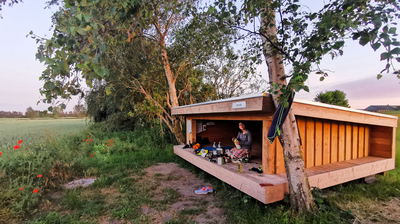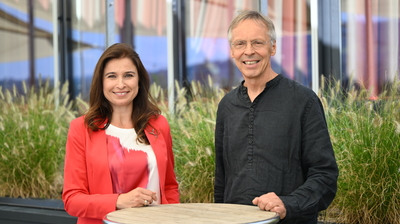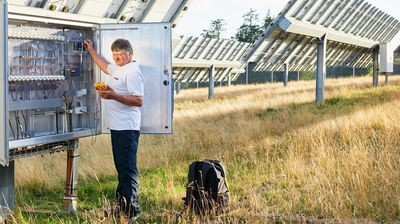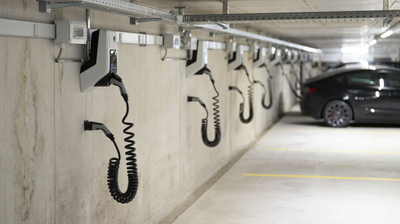BKW will continue to invest heavily in the Swiss energy system in the coming years. Its services support the expansion of private and corporate PV systems, heat pumps, and charging stations. As Switzerland’s largest distribution grid operator, it maintains and develops the backbone of the energy transition. And as an electricity producer, it is investing heavily in the expansion of renewable energies. It has promising and advanced projects in hydro, wind and solar power. These include:
- The expansion of the hydroelectric storage capacity in the Grimsel region,
i. e., the Trift project, and the raising of the Lake Grimsel dam - The two wind farms in Tramelan and Jeanbrenin
- The BelpmoosSolar ground-mounted solar plant and several Alpine PV plants in Canton of Bern, which it intends to bring to project maturity in the current year
BKW is determined to implement these projects – the sooner the better. But implementation can prove to be challenging due to the lengthy approval and objection processes. BKW has been waiting for the final construction permit for over ten years for the wind power projects mentioned above, while the two hydroelectric storage projects have already been the subject of legal proceedings and are highly likely to continue to be so in the future.
Progress in Switzerland is therefore currently being made only in small steps, for example with the Augand river hydroelectric plant, which BKW will open together with Energie Thun on September 8, 2023, and which will produce electricity for around 7,700 households. BKW will thus continue to invest in renewable energies abroad at the same time. It set an ambitious target at its Capital Markets Day in October 2021: more than 1,000 megawatts of installed capacity with wind and PV plants by 2026. BKW’s recent acquisition of wind farms in Sweden and Italy not only achieved this goal ahead of schedule, but significantly exceeded it. If the two wind farms in Puglia in southern Italy are connected to the grid in 2025 as planned, BKW will have new renewable energysources with an installed capacity of over 1,100 megawatts.

«With the acquisition of wind farms in Sweden and Italy, BKW has already significantly exceeded its 1,000 MW target. When the wind farms in Italy come online in 2025, it will be over 1,100 MW.»
80% of BKW’s investments are in Switzerland
The energy industry – and thus also BKW – is sometimes accused of preferring to invest abroad rather than in Switzerland. But for BKW this is not an either-or question, but rather a both-and question. It has invested around CHF 850 million in energy infrastructure in the past five years – of which around 80% was in Switzerland. A major part of that investment goes to maintaining and expanding the power grid. As Switzerland’s largest distribution grid operator, BKW is constantly adapting its grid to the new needs of an increasingly decentralized and more volatile energy world. However, the grid area is also confronted with lengthy approval and objection processes, which delay rapid grid expansion.
In 2022 alone, the company connected 3,624 PV systems, 1,375 e-charging stations, and 2,282 heat pumps to its distribution grid. In June of this year, the 20,000th PV system was connected to the grid in its supply region, and almost as many new systems have already been added in the first half of 2023 as in the entire previous year. These figures will continue to rise in the coming years – and with them demands on the network and the costs for its expansion. Reinforcements of the distribution network are needed in many placesto connect all the new production systems, in particular in rural and less densely populated regions.

«CHF 850 million invested by BKW in energy infrastructure in the last five years – of which CHF 680 million in Switzerland.»
Even smaller plants require grid reinforcements
Our mission now is to build the distribution network of the future. In view of the rapid change in the energy world, the modification of the grid infrastructure is correspondingly demanding. The distribution grid infrastructure as we have known it until now was designed a good 40 years ago and has not grown to meet the requirements for energy transition. This is despite the fact that the infrastructure has been continuously expanded and developed. Increasingly, the grid needs to be strengthened to handle smaller PV systems so that their decentrally produced electricity can be distributed.
BKW is already implementing several hundred such grid reinforcement projects every year. To ensure that the solar cells on the roof of the house can perform as intended, BKW has reinforced both the house connection and the upstream grid. That in itself is not a huge project. But the sum of all such reinforcements adds up to major investments – and the trend is strongly upward.
However, BKW is not only installing more copper, but is also making the network more digital and thus more intelligent. For example, it will begin rolling out smart meters in the summer of 2024 and install more than 400,000 such digital electricity meters by the end of 2028. Smart meters are an important pillar for our electricity future, because the more precisely electricity consumption and generation can be measured, the better they can be coordinated among generators, consumers and distributors. Monitoring energy with a smart meter creates a better understanding of daily electricity consumption and can help each household optimize its own consumption.
BKW is working on concrete solutions
The transformation of the electricity system will not succeed without modernizing the grids. That is why the expansion of renewable energies must go hand in hand with grid expansion. All the more so, as the politicians are currently in the process of writing very ambitious expansion targets for 2035 into law.
However, concrete solutions and projects are more important than all the figures and ambitions. BKW working on these every day – for example, at the Canton of Bern’s round tables on Alpine PV systems. BKW participated with its own projects for such plants, but also as a grid operator that has to purchase and distribute the electricity from all the plants that are finally realized. BKW helps define the best projects and implement them in a timely manner. It creates spaces for life – where new renewable energy is added and distributed, and also where the electricity produced is consumed as resource-efficiently as possible.
Our contribution to sustainability
BKW sees itself as a committed part of the solution as we advance towards a sustainable economy and society. It takes a holistic view of sustainability management, which is an integral component of its corporate management. BKW’s projects and solutions show how energy and transport infrastructures can be designed and renewed in an ecologically, socially, and economically sustainable manner. It thus makes an important contribution to reducing CO2 emissions and minimizing dependence on fossil fuels. It has also set an ambitious target for its own CO2 emissions: “Net Zero” in the Energy business by 2040.







Comments
BKW is open to respectful online dialogue (our netiquette) and welcomes your comments and questions. For questions that do not fit the topic above, please use the contact form.